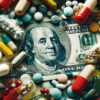A stroll around the exhibit area of the American Psychiatric Association Conference demonstrates how pharma marketing can influence the prescribing patterns of doctors — possibly at the expense of patients’ health.
If you were walking around the exhibit halls of the Jacob K. Javits Convention Center in Manhattan early last week, you wouldn’t have gone hungry for long. On offer — for free — were hot dogs, giant pretzels, mini hors d’oeuvres, and for your sweet tooth, freshly baked cookies.The American Psychiatric Association Annual Convention took over the Javits, and all those goodies were courtesy of various drug marketing companies.
Welcome to pharmaceutical marketing for health and medical professions, conference edition.
I was attending the convention’s educational sessions on behalf of MedShadow. Subjects that sounded interesting included one on the benefits and risks of marijuana as therapy for mental illnesses. One seminar addressed how psychiatrists might deal with patients who have a gun or guns at home. Another was on mental illness and gun violence. On this last session, it is important to note that those who suffer from a mental illness are more likely to be a victim of gun violence rather than perpetrate it.
Taking a break from these sessions, I walked into the exhibit hall around 2 pm one day. I was astounded by what I saw: Pharmaceutical companies had erected huge, fancy displays that included videos that would impress Hollywood producers. There was an immense plastic blimp inside the Javits Center emblazoned with a drug logo. Perhaps the most creative element in any of the pharma displays: a stack of cards 15 feet tall made to look like a model of the Empire State Building. That caught a lot of attention, but what did it have to do with the antipsychotic drug it was advertising? I don’t know.
The pharma display that got the most interest was a hotdog giveaway. Doctors make a lot of money compared to the average household income, so why was there general excitement about free franks? To be transparent, I ate 2 — it was a long Monday for me at the APA conference.
Why Should You Care about Marketing?
Does free food create a conflict of interest for health care providers? I’m not sure. But it brings up a larger point. Drug companies spend a tremendous amount of money every year — we are talking billions of dollars — trying to persuade doctors to prescribe their meds. The free weiners and hot pretzels are a drop in the bucket.
Many doctors routinely get wined and dined by pharma company representatives seeking to influence their prescribing patterns. But it’s not just food that’s an issue. Plenty of docs take money from those same companies to give talks about their drugs to colleagues. It’s a nice side business for many in the medical community, with some docs making hundreds of thousands of dollars a year from drug-company sponsored talks.
Why should you be aware of this? Because if your doctor has been taking money from Big Pharma, he or she may be acting in their best interests, not yours. Thankfully, ProPublica has an excellent resource where you can search to see if your doctor is on the pharma or device company dole. It’s called Dollars for Docs.
ProPublica has been studying this issue of pharmaceutical payments to doctors for a while. Last year they proved an association between payments to doctors and higher rates of brand-name prescribing. And just last week they published an article about a study published in the well-respected Journal of the American Medical Association that showed that at teaching hospitals with a policy against pharmaceutical reps freely walking the halls of the hospital or giving away gifts and meals, the doctors used more generic drugs and fewer brand-name drugs, saving the patients and our medical system a lot of money.
I highly suggest you check it out for all your doctors. Afterwards, you can maybe get a hot dog. But pay for it yourself.






